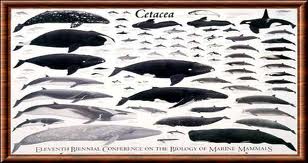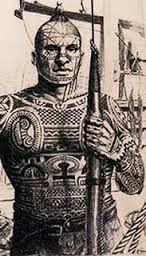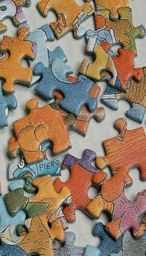Reading: Section 2
Chapters 22-42
Download This Article

In Section 2, you will be out of sight of land and in the open sea. There you will be tested. Can you endure? Can you continue a journey that seems not to have a destination? Can you live with questions and no answers? Can you live with no questions? Can you endure the Now?

In these chapters, you will meet the major characters. Remember, you are Ishmael. You will live three years with these folks on a small ship in a great ocean. You will know them well, as well as the "pecking order" and your place in it.

Chapter 32, "Cetology," is a highly detailed discourse on the various types of whales.
Informal polls show that eight of ten readers who begin reading Moby Dick give up in the middle of this chapter.
*YOU ARE NOT REQUIRED TO "UNDERSTAND" this chapter.
*SKIM. Push through.
*KEEP YOUR EYES MOVING and THE PAGES TURNING. Your goal is to finish the entire book for the grand overview.

A paradox may be either situational or rhetorical. For example, if we find ourselves in a difficult, contradictory circumstance, this would be a situational paradox; whereas, if one makes a seemingly contradictory statement that actually expresses a truth, this would be rhetorical paradox.
Examples in Moby Dick:
Ishmael, highly frustrated and possibly suicidal, escapes his teaching job by going to sea where he expects life to be calm and peaceful.
Chapter 7 The Chapel
...how it is that we still refuse to be comforted for those who we nevertheless maintain are dwelling in unspeakeable bliss; why all the living so strive to hush all the dead.... All these things are not without their meanings.
Chapter 16 The Ship
He's a grand, ungodly, god-like man, Captain Ahab....
Chapter 42 The Whiteness of the Whale
..all deified Nature absolutely paints like the harlot, whose allurements cover nothing but the charnel-house within...
What paradoxes have you observed in your own environment?

Many readers who made it through Cetology will quit about half through because they become frustrated with the fragmentation of the structure and cannot see "where the story is going".
Chapters 1-34 follow a classic storyline structure, except for Chapter 33, Cetology. Ishmael introduces himself, chronologically describes his experiences in Nantucket, then explains the different ranks on board ship. The story line progresses as most readers expect probably because we are Land People.
Somewhere after Chapter 29, when Ahab appears on deck, the structure begins to fragment. Events of one chapter do not necessarily follow the previous chapter. The writing style fluctuates from standard expression, to seemingly internal musings, to Shakespearean poetry. One chapter will be one pithy paragraph; the next, five paragraphs; the next, ten pages. Thoughts become increasingly wide ranging and disconnected from one another.
Be Ishmael.You are new at this. You are trying to figure out this environment while evolving from a Land Person to a Sea Person. You are recording observations as they come, and they do not come as an organized catalogue. You are not judging, not trying to make sense of anything. Live in the Now. Experience Life as it happens. What else can you do? You are on a ship in the middle of the ocean. You will not see land for quite a while.
Survive this journey.
Go with the flow.
Accept what is.
Read page after page after page.

Refer to the Allusions Lists for possible name symbolism. As a writer in the 18th century American Romantic tradition, Melville chooses most of his names and many events deliberately. As you know by now, he has read widely in the classics: history, philosophy, world mythology and religions, especially Biblical literature.
Chapters 22-42
Download This Article

Overview
In Section 2, you will be out of sight of land and in the open sea. There you will be tested. Can you endure? Can you continue a journey that seems not to have a destination? Can you live with questions and no answers? Can you live with no questions? Can you endure the Now?

Characters
In these chapters, you will meet the major characters. Remember, you are Ishmael. You will live three years with these folks on a small ship in a great ocean. You will know them well, as well as the "pecking order" and your place in it.
- Note the author's purpose of Chapter 24: Whaling is an important undertaking, of great significance, but little general recognition. Notice his obvious passion for the subject.
- The next few chapters in this section review the command levels on board the ship.
- During this section, get a firm grasp on Ahab's personality and character. "The Pipe," Chapter XXX (30), is important for revealing the internal conflict(s) he is experiencing. Other chapters in this section also are important for the development of Ahab. His leadership skills are shown in The QuarterDeck.
- The second person to take careful notes on is Starbuck, the first mate.
- Stubb and Flask are, perhaps, one-dimensional, but also important. Be aware of their attitude toward their work, life in general, and fate.
- Melville's characters are representational at the least, and perhaps symbolic, so pay attention to the belief system each represents.

Cetology, Chapter 32
Latin: cētus, whale; -ology, science/study of
Chapter 32, "Cetology," is a highly detailed discourse on the various types of whales.
Informal polls show that eight of ten readers who begin reading Moby Dick give up in the middle of this chapter.
*YOU ARE NOT REQUIRED TO "UNDERSTAND" this chapter.
*SKIM. Push through.
*KEEP YOUR EYES MOVING and THE PAGES TURNING. Your goal is to finish the entire book for the grand overview.

Paradox
A paradox is the juxtaposition of seemingly contradictory concepts that reveal a hidden or unexpected truth.A paradox may be either situational or rhetorical. For example, if we find ourselves in a difficult, contradictory circumstance, this would be a situational paradox; whereas, if one makes a seemingly contradictory statement that actually expresses a truth, this would be rhetorical paradox.
Examples in Moby Dick:
Ishmael, highly frustrated and possibly suicidal, escapes his teaching job by going to sea where he expects life to be calm and peaceful.
Chapter 7 The Chapel
...how it is that we still refuse to be comforted for those who we nevertheless maintain are dwelling in unspeakeable bliss; why all the living so strive to hush all the dead.... All these things are not without their meanings.
Chapter 16 The Ship
He's a grand, ungodly, god-like man, Captain Ahab....
Chapter 42 The Whiteness of the Whale
..all deified Nature absolutely paints like the harlot, whose allurements cover nothing but the charnel-house within...
What paradoxes have you observed in your own environment?

About the Novel's Structure
Many readers who made it through Cetology will quit about half through because they become frustrated with the fragmentation of the structure and cannot see "where the story is going".
Chapters 1-34 follow a classic storyline structure, except for Chapter 33, Cetology. Ishmael introduces himself, chronologically describes his experiences in Nantucket, then explains the different ranks on board ship. The story line progresses as most readers expect probably because we are Land People.
Somewhere after Chapter 29, when Ahab appears on deck, the structure begins to fragment. Events of one chapter do not necessarily follow the previous chapter. The writing style fluctuates from standard expression, to seemingly internal musings, to Shakespearean poetry. One chapter will be one pithy paragraph; the next, five paragraphs; the next, ten pages. Thoughts become increasingly wide ranging and disconnected from one another.
Be Ishmael.You are new at this. You are trying to figure out this environment while evolving from a Land Person to a Sea Person. You are recording observations as they come, and they do not come as an organized catalogue. You are not judging, not trying to make sense of anything. Live in the Now. Experience Life as it happens. What else can you do? You are on a ship in the middle of the ocean. You will not see land for quite a while.
Survive this journey.
Go with the flow.
Accept what is.
Read page after page after page.

Suggested Activity
Refer to the Allusions Lists for possible name symbolism. As a writer in the 18th century American Romantic tradition, Melville chooses most of his names and many events deliberately. As you know by now, he has read widely in the classics: history, philosophy, world mythology and religions, especially Biblical literature.